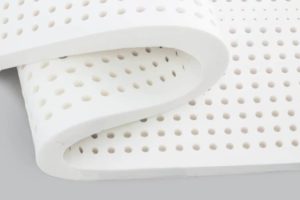Buying a new mattress isn’t the sort of thing most of us do willy-nilly. The majority of shoppers do quite a bit of planning to come up with a list of features that they feel will deliver the most comfort. And that’s followed up by plenty of research to find the bed that best meets those personalized qualifications.
Accomplishing this isn’t always easy. Even if you know exactly what you want in a new bed, it can be tough to figure out whether a mattress that seems like it should be the right fit will actually live up to its claims. This can be especially true if you’re thinking about making your purchase online, where there usually isn’t an opportunity to try before you buy.
That’s where online mattress reviews come in. The right ones can be a quality source of honest, unbiased information about a particular bed. And it’s the quickest way to tell whether a product is likely to meet your needs—or set you up for nights of uncomfortable disappointment.
But where can you find them—and how can you tell legit reviews from ones that might be phony? Just as important, what can you rely on these kinds of testimonials for, and are there times when they might not be that helpful after all? In this article, we’ll cover all that and more.
The Bed With the Best Mattress Reviews
If you plan for customer feedback to play a big role in your purchasing decision, you may want to consider looking into Amerisleep’s AS3. With nearly 4,000 verified customer testimonials earning 4.8/5 stars, it consistently ranks among the top-rated memory foam mattresses.
The AS3’s massive popularity seems to stem from its versatility. It blends both support and softness, making it ideal for a range of sleep positions, as well as for couples with different sleep styles. Amerisleep’s AS3 is our recommended mattress for sleeping on your side.
And like all of Amerisleep’s offerings, the AS3 boasts the brand’s proprietary Bio-Pur foam with specialized comfort layers to create a plush feel that responds to pressure points. In short, this bed is a crowd pleaser that has earned some of the best mattress reviews out there.
Why Online Mattress Reviews Matter
You might check Yelp before deciding whether you should try a new restaurant or coffee shop. Maybe you stop to see how many stars a hair salon has on Google before booking an appointment. And how many times have you ended up picking a product on Amazon because it got more positive ratings than its competitors?
Nowadays, most of us rely on this kind of customer feedback to make purchasing decisions big and small. And for good reason: Unbiased reviews come from real individuals just like you. If tons of people rave about something, you can be relatively sure that it will deliver. And if a problem or issue repeatedly comes up, you can reasonably expect that it might be an issue for you too.
In short, customer feedback can be a wealth of information to help you learn about factors both good and bad. So why wouldn’t you use it when shopping for a new mattress? As long as you’re relying on reviews that come from legitimate sources, this sort of information can only aid you in finding the bed you’re looking for—and weed out any potential contenders that might not be the best fit.
Questions Quality Reviews Can Help You Answer
Deciding to incorporate customer feedback into your mattress search is a smart move. Often the best testimonials tend to touch on a number of different factors, and all of them can be useful for making an educated purchasing decision. Here’s a look at some of the important questions that buyer assessments can answer, and how they can help you while you shop.
1. What does the bed feel like?
 First and foremost, reviews can go a long way towards deciphering the most important thing of all: Whether a mattress is comfortable. Which can be helpful, but by itself, it isn’t always enough. Comfort is subjective, after all. What you really want is to find out whether a bed will be comfortable for you.
First and foremost, reviews can go a long way towards deciphering the most important thing of all: Whether a mattress is comfortable. Which can be helpful, but by itself, it isn’t always enough. Comfort is subjective, after all. What you really want is to find out whether a bed will be comfortable for you.
It’s good to look out for testimonials that actually describe what makes a bed feel comfortable (or uncomfortable). For instance, did the firm surface cradle the sleeper’s back, or create an uncomfortable sinking situation? If someone sleeps on their stomach, did it give them the right support? Did the soft surface feel dreamy and cloudlike, or was it not as cushy as the sleeper expected? These kinds of comments can help you see whether a bed will give you the kind of support you’re looking for. And ultimately, be a comfortable fit.
2. Can it help with my sleep issues?
Are you looking for a bed that will ease problems with things like chronic lower back pain or snoring? Do you need a mattress that minimizes motion transfer so you won’t be disturbed when your partner moves (or vice versa)? Here’s another big area where reviews can come in handy.
If a mattress helps minimize a customer’s chronic health problem or soothes a sleep issue in some way, there’s a good chance they’ll share some enthusiastic feedback about it. On the other hand, if it doesn’t make a difference—or makes the problem even worse—you can bet that many customers will want to be vocal about those complaints. Pay attention to their experiences and see how they might apply to your own circumstances.
3. Does it have any heat or odor issues?
Problems like heat retention and chemical odors or off-gassing might not be first on your mind while you mattress shop. Especially if you’ve never dealt with these sorts of issues with previous beds that you’ve owned.
But if you’re in the market for a memory foam model—particularly if it’s your first time—you’ll want to take heed. Heat and odor are somewhat common complaints among memory foam owners.
It’s important to note though that not all memory foam models pose these problems. While some brands seem to rack up a high level of complaints about heat or odor issues, for other brands, these problems are rarely reported. That’s why it’s a good idea to check whether a bed’s has received negative feedback in this area.
4. Does it hold up well after purchase?
After comfort, durability is one of the most critical factors for most customers. A bed has to feel great when you first begin sleeping on it, of course. But it should also stay that way for a good, long while.
Of course, all mattresses will start to degrade over time. After years of use, it’s normal for sagging or lumpiness to become issues. But these sorts of problems really shouldn’t become apparent until you’ve had your bed for 7 to 10 years.
Reviews can help you get a good sense of a model’s durability. If multiple customers complain that the bed started to lose its cushiness or develop sagging after just a short period, the model might not be very durable. And that can make it a poor value overall. If your bed has an unusually short lifespan, you won’t get your money’s worth.
Of course, defects can still happen, even when you’re dealing with a bed that has repeatedly earned rave reviews for its longevity. So if you notice an issue where your new purchase isn’t performing the way that it seems like it should be, consult your bed’s warranty policy. If the issue is covered, the manufacturer should replace or repair your bed at no cost to you.
5. What is the customer service like?
 A manufacturer’s customer service might not be at the forefront of your mind while you shop. But it’s a worthwhile factor that you shouldn’t discount. A brand that’s known for delivering top-notch customer service can make the buying process easier, and it can save you a major headache if you run into any problems with your bed down the road. Poor customer service, on the other hand, can make your life more difficult.
A manufacturer’s customer service might not be at the forefront of your mind while you shop. But it’s a worthwhile factor that you shouldn’t discount. A brand that’s known for delivering top-notch customer service can make the buying process easier, and it can save you a major headache if you run into any problems with your bed down the road. Poor customer service, on the other hand, can make your life more difficult.
While reading reviews, be on the lookout for any write-ups that mention the customer’s overall experience with buying and delivery. Was the manufacturer transparent about pricing and willing to answer questions? Did the bed arrive when they said it would? Did they go above and beyond to help with an issue or request?
Also keep your eyes peeled for mentions of any problems. A customer feeling like they weren’t getting a straight answer to a question, excessive delivery problems, or having to jump through hoops to return a mattress or take advantage of a warranty are all red flags.
6. Did it live up to the overall expectations?
Mattress shopping involves a lot of research. So by the time a shopper finally gets their new bed, they probably have a good idea of what to expect from their new purchase. But sometimes, these expectations just don’t match up with that the product is actually like.
Occasionally a new bed will exceed a customer’s expectations, and they’ll be even happier with their purchase than they thought they would be. But more often, a lower quality mattress just won’t deliver on what the customer was hoping for. Again, pay attention to reviews that make these sorts of claims. They could help you avoid disappointment—and the hassle of having to make a return and start your mattress search all over again.
Finding Quality Reviews
Customer feedback can be one of the best ways to get an insider’s look on a bed’s comfort and performance level. The key is finding reviews that come from legitimate sources, so you can trust that the information you’re getting is from real people who are sharing their honest opinions and real experiences. Not those who are paid to write positive testimonials.
The Best Type of Reviews to Look For
There are a few places to find honest feedback that you can trust. The first is from third-party websites that publish unbiased, independent ratings and reviews. Usually, they compile large amounts of data pulled from a range of verified sources, which allows them to create product rankings in a number of specific categories. If there’s a specific issue that you want to check feedback on—like pain relief, motion isolation, or longevity—these can be excellent resources.
 Manufacturer websites themselves can also be a valuable source for reviews. You just have to make sure that the manufacturer reviews are monitored by a third-part verifier. That ensures that the brand can’t edit or delete feedback that they view as unfavorable, or bump positive feedback to the top, where its more likely to be seen.
Manufacturer websites themselves can also be a valuable source for reviews. You just have to make sure that the manufacturer reviews are monitored by a third-part verifier. That ensures that the brand can’t edit or delete feedback that they view as unfavorable, or bump positive feedback to the top, where its more likely to be seen.
Rest assured that if a brand’s reviews are third-party verified, that information will be easy to find on their website. Amerisleep, for instance, has a clearly displayed page explaining that their reviews are validated by PowerReviews, so you can trust that the feedback you’re reading is 100% authentic. If a brand’s website doesn’t offer up any information about where their feedback is coming from or how its authenticated, there’s a chance that it may be fake.
Reviews To Consider Avoiding
Authentic customer feedback can be a goldmine for mattress shoppers. But biased reviews that make a bed seem better than it actually is are not only unhelpful. They can encourage you to shell out big bucks for a bed that doesn’t actually deliver on what you need.
Reviews on a manufacturer or retailer website that aren’t managed and verified by a third party might not be trustworthy. If a brand has the ability to screen and edit their own reviews, they’re probably more likely to feature favorable feedback rather than unfavorable feedback. And even if they do share a few less-than-stellar reviews, these write-ups may have been massaged to be less harsh than what the reviewer originally wrote. In other words, you can’t always count on them to give you a clear picture.
Testimonials written by paid reviewers or by those who received a bed for free should also be looked at with a skeptical eye. Even if the person aims to be sharing their real, unfiltered opinion, it may be hard for them to remain completely neutral. If the reviewer happens to be a blogger you trust or even someone that you have a personal relationship with, you don’t have to discount their feedback altogether. Just take it with a grain of salt, and see if their assessment matches up with info from other, unbiased sources.
When Reviews Might Not Help
Even the most thorough, unbiased feedback won’t be helpful for all shoppers all of the time. Why? First, because comfort is subjective. Even if a bed consistently earns top ratings from customers, you still might not love the way it feels. Everyone has different sleep preferences, and there’s no magic formula for ensuring that a mattress will be ideal for 100% of shoppers.
 But most often, this mismatch happens when a shopper is relying on reviews for a product that isn’t designed to meet their needs in the first place. Think about it: If you need a pair of basketball sneakers, reading testimonials for a pair of sandals isn’t going to help you. Even if every customer swears that the sandals are the most comfortable, most supportive pair of shoes they’ve ever worn, they’re still sandals. No matter what, they’re not going to perform like basketball sneakers.
But most often, this mismatch happens when a shopper is relying on reviews for a product that isn’t designed to meet their needs in the first place. Think about it: If you need a pair of basketball sneakers, reading testimonials for a pair of sandals isn’t going to help you. Even if every customer swears that the sandals are the most comfortable, most supportive pair of shoes they’ve ever worn, they’re still sandals. No matter what, they’re not going to perform like basketball sneakers.
Get into the same mindset when shopping for a new bed. Well before looking at reviews, make a list of the must-have characteristics and features that you’re looking for. Once you have an idea of what you do (and don’t) want, you can start scouring the feedback and testimonials for products that match up.
Here are some questions to think about that can help you pinpoint what you want in a bed and start shopping in the right direction:
- What’s my budget? Am I willing to go above my upper limit if my dream bed is at a higher price point?
- Do I want a memory foam or traditional innerspring bed?
- Do I want a firm, medium, or soft mattress?
- Do I need a mattress with features to accommodate my partner—like motion isolation?
- Am I especially sensitive to heat or odors while I sleep?
- Am I looking for a product that’s made with plant-based or eco-friendly materials?
- Do I want a bed with a generous at-home trial period?
- Am I OK with buying from a lesser-known brand with favorable feedback, or am I more comfortable buying from a legacy brand?
Of course, these are just some of the questions that can help you determine your preferences. But they can help set you off in the right direction. As you begin researching different brands and models, you might come across other issues or questions that you’ll need to think about.
Research in Action: Using Online Mattress Reviews to Shop Smart
 Now that you’ve got a basic sense of how testimonials can help you shop and where to find trustworthy feedback, it’s time to put this information to good use. Here’s a brief step-by-step guide for doing just that.
Now that you’ve got a basic sense of how testimonials can help you shop and where to find trustworthy feedback, it’s time to put this information to good use. Here’s a brief step-by-step guide for doing just that.
1. Figure out what you’re looking for.
Decide on your budget and mattress preferences. Once you know what type of bed you’re looking for, narrow down the options to a handful of picks that seem like they could meet your needs. Focusing on just a few selections—say 3 to 5 total—will feel less overwhelming than trying to research 50 different beds.
2. Look for reviews for each option.
Seek out verified reviews for each of your contenders. The manufacturer’s website is always a good place to start. If they doesn’t seem to offer verified, third-party reviews, that could be a red flag that the brand isn’t worth buying from.
3. Scan the feedback and look for trends.
Reading every single testimonial in detail would probably take forever, so don’t feel like you have to do that. Instead, try to scan for keywords calling out issues that are important to your individual search, like “back pain,” “heat,” or “great value.”
Another tip: Try to step back and see the big picture. If a product mostly has very positive reviews, don’t give too much weight to a single negative review—it’s probably an outlier. And remember that the opposite is just as true: If the majority of customers are dissatisfied with a product, you shouldn’t put too much stock in a single glowing testimonial.
4. Pick your favorite.
You might decide to go with the bed that’s earned the most favorable feedback. But there’s no rule saying that you have to do this. If another model just seems like it would be a better fit, go with your gut. Maybe the second- or third-best option has an unusual feature that you really want, or the price point is more in line with your budget, for instance. No matter what the deciding factor, you know what’s best for you, so go for it.
Time to Start Shopping
 You’re armed with all the information to use customer testimonials to your advantage—and make an educated purchase. Now, it’s time to start shopping, look for trustworthy feedback, and find your best bed.
You’re armed with all the information to use customer testimonials to your advantage—and make an educated purchase. Now, it’s time to start shopping, look for trustworthy feedback, and find your best bed.
If you’d like to start your search with an option that consistently earns excellent customer feedback, you’d do well to consider taking a look at Amerisleep’s AS3. As a top-ranked bed from a manufacturer that only features authentic verified reviews, AS3 owners are some voices that you can trust.
Of course, everyone’s preferences are different, and there’s no one perfect mattress for everyone. So put together your list of must-haves, whittle down your options, and start seeing what others have to say. Their honest opinions just might help you get a better night’s sleep.
